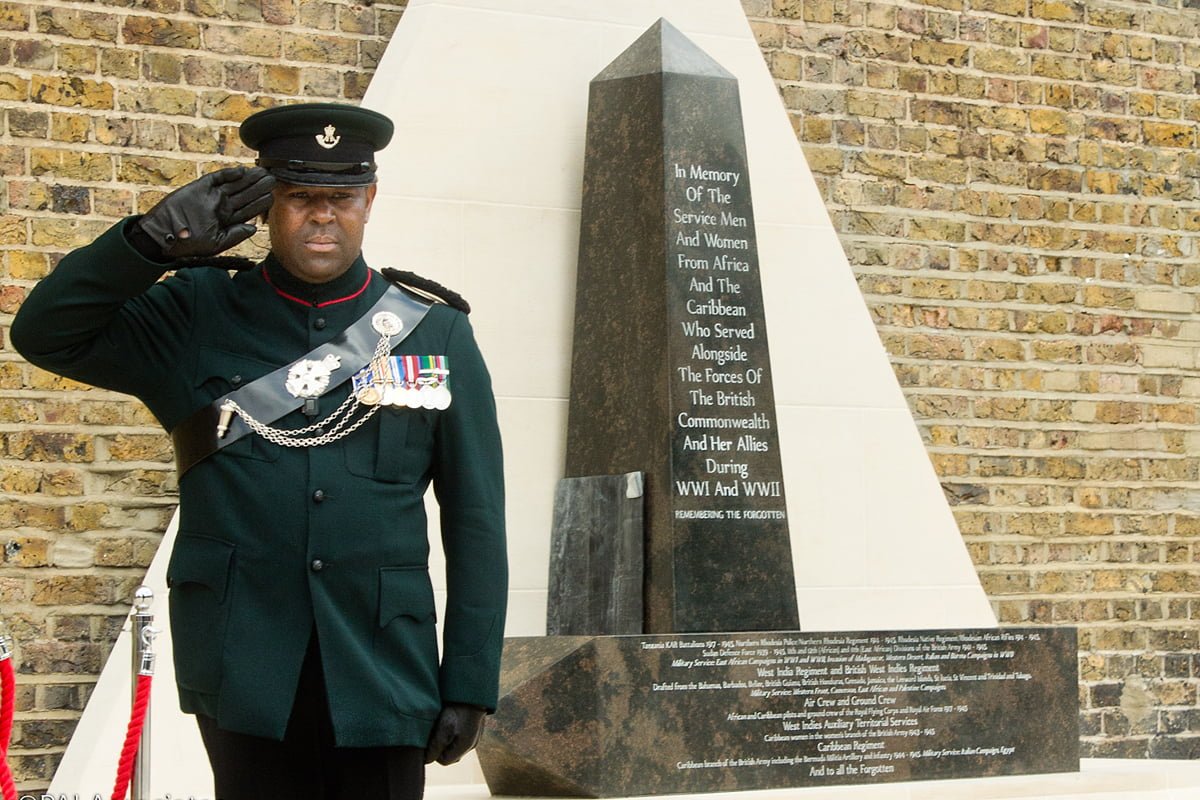On Windrush Day, in Windrush Square, a longstanding injustice was finally addressed with the official unveiling of a memorial commemorating the sacrifices made by African and Caribbean soldiers, sailors, airmen and auxiliaries in the two world wars.
At a moving event in a rather breezy Brixton, south London, on 22 June, Defence Secretary Sir Michael Fallon said: “This recognition is long overdue. The memorial is a tribute to those who fought with the African and West Indian regiments, performing always with unmatched courage.”
According to the Ministry of Defence, more than 15,000 Caribbean soldiers served in the British West Indies Regiment in the First World War. They saw action in Europe and beyond; 2,500 were killed or wounded. Another 55,000 were recruited from Britain’s west and southern African colonies, mostly serving in Africa and the Middle East – around 10,000 men were killed. Similar numbers served with the Navy, Army, Air Force and ATS in the Second World War.
Until now, this contribution has not been officially recognised. While animals that ‘served’ in conflict were deemed worthy of a memorial, African and Caribbean men and women were not. Yet, as Fallon reminded us, “It is thanks to their bravery and sacrifice that we are able to enjoy our freedoms today.”
The memorial initiative has been led by the Nubian Jak Community Trust and received support from the government, Lambeth Council, the Black Cultural Archives and many other organisations and individuals.
The ceremony opened with a performance by Brixton-based London All Stars Steel Band and an introduction by Nubian Jak founder Jak Beula. After multi-faith prayers and a traditional African libation by Professor Gus John, Baroness Howells OBE read a letter from the Queen, who sent her “warm congratulations to all involved with this impressive project, which celebrates the resolute courage of the two million African and Caribbean soldiers who served in the First and Second World Wars”.
“This is about telling the truth,” said former CRE chair Baron Ouseley. Cheers greeted his remark that “Still today people haven’t got a clue about the contribution that was made.” Brigadier David Williams, formerly of the 1st Battalion Kings African Rifles, highlighted the value of that contribution by paying tribute to the African troops (known locally as askari) who fought in Malawi and Burma. “It’s vital that we pass this on to the next generation,” said London Mayor Sadiq Khan.
A cappella group NitroVox joined with Pegasus Opera Company to sing the memorial theme ‘I Have a Song’, with nearby church bells chiming in harmoniously. However, a few moments later the lone bugle that marked the start of a minute’s silence was almost drowned out by a more familiar Brixton sound, the police siren. Fortunately, a few moments peace did descend on wind-ruffled Windrush Square, and when the bugle sounded again a flock of pigeons darkened the sky overhead in an aerobatic display that recalled those old wartime films of Battle of Britain dogfights.
To the accompaniment of a military band, high commissioners laid wreaths at the memorial, unveiled by Major Larry Davis, standing in for Lance Sergeant Johnson Beharry VC. It’s a dark, slender obelisk engraved with the words “In Memory Of The Men And Women Of African Descent Who Served Great Britain In Military Campaigns During World War I and World War II”. At this point, medallions commemorating some of those who served were presented to their relatives and, in the case of Allan Wilmot and Norma Best, to the individuals themselves.
The band led a parade representing all the services, veterans and former nurses representing ‘The why are West Indians’ project from Birmingham, the Royal Military Police and cadets. Bringing up the rear were performers from Ghanaian group Gahu who gave a thrilling demonstration of acrobatic agility, fire-eating and stilt-walking.
Poet Nairobi Thompson had accepted a medallion on behalf of her great-uncle Walter Tull. He was one of the first black professional footballers and lost his life on the Western Front in 1918. He therefore missed the shocking race riots of the following year, which his grand-niece used as the basis for ‘Riotous Indignation’. Her second work, ‘Colonial Soldiers Hymn’, was beautifully and movingly performed by children of Holy Trinity C of E Primary School.
Finally, 100 doves were released from their wicker baskets next to the memorial. As they soared upwards, the white birds crossed with a similar-sized flock of dark-feathered pigeons. The mingling recalled Fallon’s words of an hour or so earlier, “It is our shared history on this memorial that shows there is more that connects us than divides us.”








